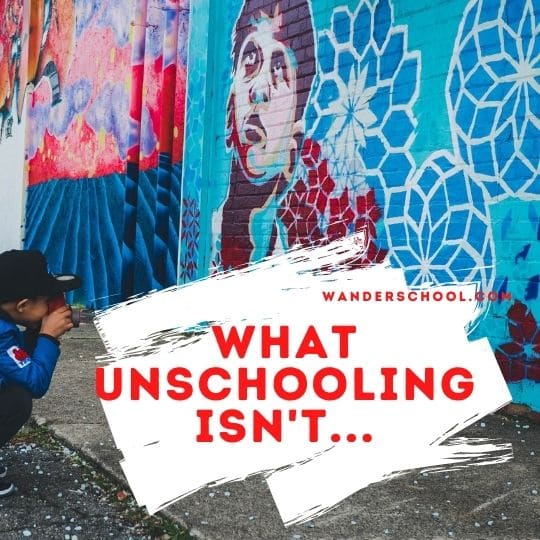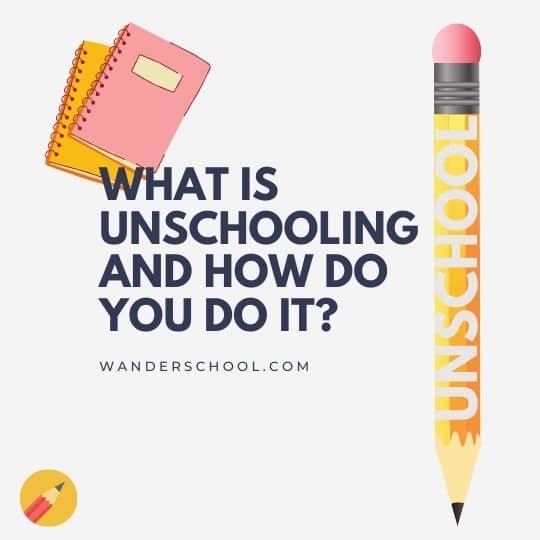Unschooling is not what it might sound like. But in a way it is.
Confused? I get it.
That’s why I wanted to write What Unschooling is Not, and What Unschooling is. I hope this guide will give you clarity and understanding.
Affiliate Links Disclosure: My posts sometimes contain affiliate links, which mean that if you click on them and make a purchase or sign up for an offering, I may earn a commission, at no added cost to you. I received no compensation for writing this post, and it reflects my own experiences, research, and opinions. You can read my my privacy policy here. Thank you so very much for reading my blog!
Unschooling Does Not Mean Doing Nothing or Neglect
Unschooling is not neglecting the kids. It is not ignoring them. It is also not depriving them of an education, support, encouragement, love, or care. Unschooling does not mean controlling kids or sheltering them.
Unschooling most definitely doesn’t mean that a parent can’t teach, guide, facilitate, influence, or shape a child’s education or learning experience.
And still, unschooling doesn’t mean that a parent is hands off or is uninvolved with their child’s education. It certainly doesn’t mean that a parent gives up.
To many, unschooling also isn’t about setting limits on a child’s potential, or defining what they should or shouldn’t learn–or who she or he can be.
Unschooling doesn’t look look the same – there’s no unschool formula
For many families, unschooling is more than simply an approach to learning at home.
Some look at unschooling as a lifestyle, where organic, natural learning, or experience based learning happens 365 days a year according to a child’s interests. On no fixed or rigid schedule, other than that guided by an individual child’s own interest, curiosity, motivation, goals, and abilities.
Life without School
Unschooling is a life without school. And there isn’t a formula. There’s no secret sauce. Other than perhaps honoring and supporting a child’s interests. Through daily living and lifestyle, children learn. When given space, freedom, and support to learn, children naturally are driven to learn about the world around them. They are naturally curious and want to figure things out. And learn. And grow through self-education.
Yes, unschooling is life without school. But that is not the same as life without learning.
By far, every parent I’ve met who unschools his or her child, is a parent who choose to unschool for the benefits and opportunities offered to his or her child. The unschool choice was intentional and purposeful. The choice was made to give the child an interest-led learning experience that would prepare the child for life, and instill a passion for lifelong learning.
No tests, No Memorization
For some, unschooling means no tests, no memorization, no use of tools or scenarios concocted to keep kids busy for busyness’ sake.
It means keeping it real. All of it. Life. Learning. One’s potential.
For many, unschooling means joyful, peaceful, happy learning. Instead of coercing children to do their homework or threatening to take away their privileges, they are excited and motivated to learn because learning happens organically by doing. Doing exactly what they are interested in.
Let me give you an example. This week, I didn’t have to make my 13 year old unschooler learn about DNA. She wanted to and spent hours researching and learning details (and answers to her own questions) that long escape my university-level biology education.
I didn’t have to force my 15 year old to teach himself the programming language Assembly. I didn’t have to ask him to work on math. He did that himself because he has lofty goals and he knows he’s going to need a solid math background.
I didn’t have to ask, beg, or plead with my 10 year old to study geography.
Instead, I encourage my kids and their interests by giving them a steady supply of resources, like workbooks, books, a strong wifi connection, electronics, library or bookstore trips, and school and art supplies, so they can study, create, and dream. Unschooler creativity is mind blowing.
Unschooling Makes People Unfamiliar with the Idea Uncomfortable
People who are unfamiliar with unschooling or the concept (or homeschooling generally) often get itchy around the idea. After all, how can kids learn if they aren’t sitting behind desks or riding a bus to school?
Let’s be real. Humans are creatures of habit. The idea of going to school is comfortable to most because that’s what they did. It’s familiar.
But guess what? There was a time when homeschooling (and unschooling) was the norm. It was normal. The idea of sending kids off to spend their days in a classroom, away from their families, wasn’t the norm. It wasn’t normal.
It’s one thing to think about how tough it is for Americans to wrap their head around the idea, and another thing for people in other countries. For example, in France, the concept of homeschooling alone is shocking to many people and there’s even a movement to ban homeschooling altogether. People ask, why would you homeschool when there are schools?
Unschooling is not Self-Worth Based on Grades
Unschooling is not defining self-worth or value based on grades, test results, or teachers’ opinions. This concept is a big deal (and hard to understand in other places, such as France, where value and career path are typically determined by grades and teachers). It is allowing children to determine their own self-worth and value.
Unschooling isn’t leaving kids to do nothing all day
Unschooling isn’t about leaving kids to do nothing all day, like gaming for days on end or leaving them to stay in bed all day. Although, like any form of education, there are degrees to what is or isn’t allowed.
It’s not about not checking out as a parent, having no limits or rules, or giving into everything a child wants. It’s not about becoming a “yes man (or woman)” to your child. Sure, some families may operate this way, but I think if there’s anything close to an unschooling norm, it would be that families tend to be involved and encourage communication.
The choice to unschool is about taking charge of your child’s healthy development, and supporting their personal growth and learning throughout childhood. More often than not in my experience, unschooling parents strive to support and encourage their children’s interests that will help them grow into strong, self-sufficient, independent, healthy, and capable adults.
As an unschooling parent, sometimes I think that I am wayyyyyy more concerned about my child’s education than other parents are about their kids’ education. Not because I’m concerned about their ability to get into college, if that’s the path they choose, but because I want them to love relentlessly pursuing their interests, passions, and the world around them…and I don’t want them to miss out on an opportunity to do so.
What Unschooling Is and What It’s Not
If this look into what unschooling is and what it’s not has been helpful, please considering sharing or pinning this post, if you happen to be on Pinterest.
Of course, please do drop a comment below. I’d love to hear from you.
Follow Julie on Social Media! 😉
Subscribe to the Wanderschool Newletter. Get the latest travel news delivered right to your inbox.




I’ve always wondered at the world of unschooling as a veteran teacher. I’m pleased to discover that what you’ve described is quite similar to how I teach my gifted students through their interests.